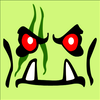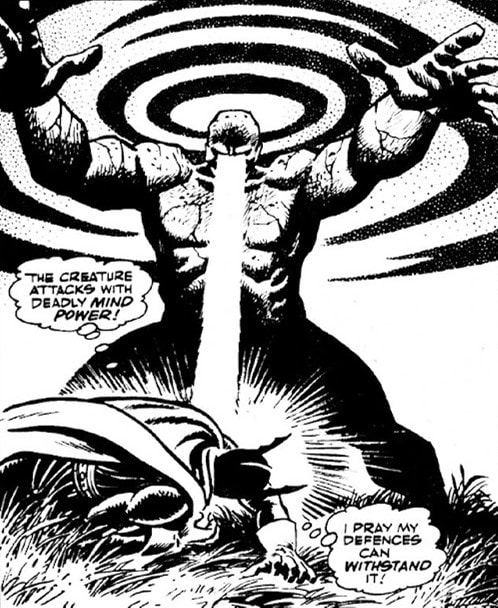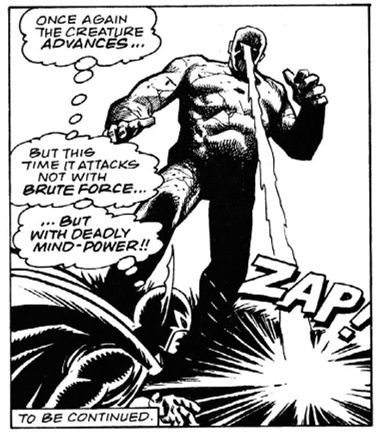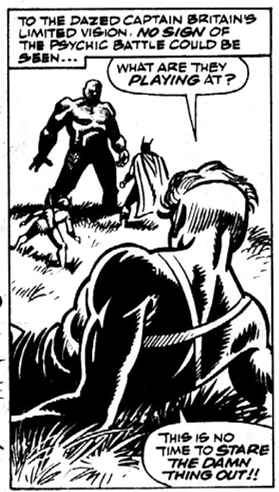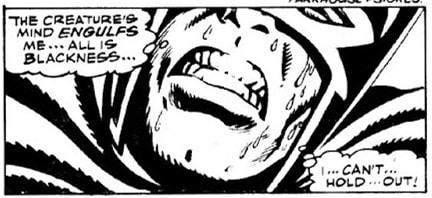Read my blog on psionics in early D&D here and my discussion of psionic monsters here.
Psionic Potential
Psionic Potential is a new General Feat that any character can choose instead of the normal Feats available. This marks the awakening of the character's Psionic powers .
Psionic Potential gives the character access to one Psionic attack mode and one defence mode:
- PSIONIC BLAST: a raw shriek of mental force that is capable of affecting even non-Psionics, inflicting confusion (as the Magic-User spell) for 2d4 rounds (but psionic blasting a non-psionic opponent incurs 2 points of Psionic Stress - see below)
- MIND BLANK: a basic mental defence that is effective against all the Psionic attack modes, offering the newly-awakened psionicist all-round protection
Psionic Feats
Whenever a psionicist would be eligible for a new Feat, they may choose a Psionic Feat from this list.
- Discipline - Psychokinesis
- Discipline - Psychometabolism
- Discipline - Psychoportation
- Discipline - Telesentience
- Train the Mind - gain a Psionic Science based on a Discipline you already have (the player can propose a powerful effect but the Maze Controller must approve it
When a character rises to an even numbered level and is eligible to increase two Abilities, they may instead improve as a Psionicist:
- Increase the size of the Stress Die (from d6 to d8, then d10, as high as d12)
- Construct a Psychic Decoy: this is expended when the character would incur a Psionic Penalty or be defeated in Psionic Combat
The Stress Die
When you use a Psionic Discipline, you gain a point of Psionic Stress and roll your Stress Die (usually a d6). If you roll higher than your current Psionic Stress, all is well. If you roll equal to or less than your current Psionic Stress, you have lost control of your Psionic powers and a consequence will follow:
The good news is that when you fail a Stress test, you remove some of your current Psionic Stress equal to the number you rolled on the Stress Die, putting you in a better position to use your powers in the future.
When you use a Psionic Discipline, you gain a point of Psionic Stress and roll your Stress Die (usually a d6). If you roll higher than your current Psionic Stress, all is well. If you roll equal to or less than your current Psionic Stress, you have lost control of your Psionic powers and a consequence will follow:
- Alarm: A Psionic Wandering Monster (or psionicist NPC in the dungeon) detects your presence and location and moves to encounter you
- Exhaustion: Your Psionic powers go dormant and you are no longer treated as a psionicist until you recover them
- Insanity: You suffer a Derangement
The good news is that when you fail a Stress test, you remove some of your current Psionic Stress equal to the number you rolled on the Stress Die, putting you in a better position to use your powers in the future.
Removing Psionic Stress
Triggering a Stress Penalty removes some of your Psionic Stress as does being defeated in Psionic Combat, but those are both bad things. A psionicist may remove a point of Psionic Stress from a good night's sleep (uninterrupted, no watch duty) and/or a good day of ordinary (non-adventuring) activity. This means, at home and while resting, most characters will remove all their Psionic Stress in three days.
Psychic Decoys reform when a psionicist on full HP and no Psionic Stress rests (as above).
Triggering a Stress Penalty removes some of your Psionic Stress as does being defeated in Psionic Combat, but those are both bad things. A psionicist may remove a point of Psionic Stress from a good night's sleep (uninterrupted, no watch duty) and/or a good day of ordinary (non-adventuring) activity. This means, at home and while resting, most characters will remove all their Psionic Stress in three days.
Psychic Decoys reform when a psionicist on full HP and no Psionic Stress rests (as above).
|
Talents & Sciences
When you acquire a new Psionic Discipline, you gain a new attack and defence mode, giving you more options in Psionic Combat. You also acquire a Talent which is a Psionic power that you can call upon at will, at the cost of taking a point of Psionic Stress and making a Stress Test. When a character reaches an even-numbered level they may choose two attributes and increase them by +1 each. A psionicist may forego this and instead choose another Talent from a Psionic Discipline they already know. A Science is a much more powerful Talent. A player who takes this Psionic Feat can suggest a Science to the Referee. It should be a more powerful version of a Talent they already possess. If the Referee approves it, the PC gains the Science. Using a Science incurs 2 points of Psionic Stress. |
Some Rules for Psionic Talents/Sciences
- Simultaneous: Psionics occur at the speed of thought - literally! Treat them as simultaneous and there is no limit to how many Psionic Talents a psionicist can use in a round, subject only to restrictions on concentration and the need to make a Stress Test after each one.
- Concentration: You can only concentrate on one Psionic power at a time. In a peaceful and safe setting, a character could concentrate all day until they need to sleep. In a dangerous or insecure setting (e.g. any dungeon or adventure), concentration can be maintained for a turnplus one turn per bonus from Intelligence. In a confusing and distracting setting (e.g. any combat), concentration can be maintained for 1d6 rounds, plus Wisdom bonus. Taking physical damage does not break concentration but engaging in Psionic Combat or being affected by mind-alteration (spell, Psionics or monster power) does.
- Perception & Familiarity: Most Psionic powers require you to perceive the target as a mind; that is, see them acting or hear them speaking. Psionic powers that detect minds directly count as 'perceiving' and, once that connection is made, other powers can be used. Some powers affect a person or place that is familiar. 'Familiarity' is quite demanding: you must be able to visualise a place in great detail or know personal details about another creature. A room you once searched or a monster you once fought do not count as 'familiar': this usually limits powers to friends and homes but it could include personal enemies and places you were imprisoned. Perceiving something through magic (e.g. the detect chaos spell) or becoming familiar through magic (e.g. clairvoyance) does not count as establishing a Psionic connection (see optional rule below).
- Saving Throws: Most Psionic effects do not allow saving throws. If the psionicist takes Psionic Stress and concentrates then the effect occurs. The limitations of Psionics are the stress and the concentration, not the unreliability of the outcome. However, non-psionicists get to save vs Wands to avoid the effect of Psionic Blast.
- Magic (optional): Psionics are not magical and do not interact with magic. Psionic effects only work on physical beings, not spirits or energy creatures or entities without discernible minds. Psionics are not blocked by magical barriers and magical powers are not blocked by Psionic protections. Magical scrying (e.g. a Crystal Ball) does not count as 'perception' for purposes of launching a Psionic attack and Psionic scrying (e.g. Telesentience) does not enable spells to be cast at the target.
Discipline - Psychokinesis
Psychokinesis involves moving things with your mind, but really this is the mental control of energy so it includes creating and suppressing fire, electricity, and even sound or sight.
Attack Mode: Id Insurgency
Defence Mode: Mental Barrier
The Id Insurgency is a similar attack to Psychic Blast (though it only works on other psionicists) and dominates opponents (treat as Charm Monster for as long as you concentrate) but it is less effective on the insane. Mental Barriers are another all-purpose defence mode. Both modes involve Wisdom bonuses or penalties.
Possible Talents:
Psychokinesis involves moving things with your mind, but really this is the mental control of energy so it includes creating and suppressing fire, electricity, and even sound or sight.
Attack Mode: Id Insurgency
Defence Mode: Mental Barrier
The Id Insurgency is a similar attack to Psychic Blast (though it only works on other psionicists) and dominates opponents (treat as Charm Monster for as long as you concentrate) but it is less effective on the insane. Mental Barriers are another all-purpose defence mode. Both modes involve Wisdom bonuses or penalties.
Possible Talents:
- Body Weaponry: fight as if your body were armoured (AC 4) and armed (as a +1 sword)
- Invisibility: only works on creatures with fewer Hit Dice, but undetectable with magic and allows you to fight invisibly
- Molecular Agitation: cause things to catch fire, evaporate, or becoming burning hot (like heat metal) - or freeze solid
- Cause a weapon to fight as if you were wielding it for as long as you concentrate (use your Wisdom bonus for To Hit and damage)
- Break open a non-magical dungeon door or lift a portcullis
- Levitate an object that weighs less than you do for as long as you concentrate
- Throw objects you could pick up with one hand for as long as you concentrate, possibly as missile weapons (use your Wisdom Bonus for To Hit and damage)
- Freeze a physical creature up to twice your size for as long as you concentrate
- Block an incoming physical attack after To Hit has been rolled but before damage - or cause such an opponent to attack themselves or someone else in range before they roll To Hit
- Psychokinetic Sciences might include breaking down walls or fortifications, throwing multiple objects (perhaps 1d6 + Wisdom Bonus in number), outright cancelling magical fire or cold damage, creating fireballs or ice storms that deal lots of damage (perhaps 1d6 plus an extra d6 per Wisdom Bonus); Energy Control (make yourself immune to an energy attack), Molecular Rearrangement (transmute an object into another substance), Telekinesis (up to the weight of a person)
Discipline - Psychometabolism
This is the power of mind over body - initially your own body but Sciences might let you alter other people's bodies too.
Attack Mode: Psychic Crush
Defense Mode: Thought Shield
The Psychic Crush is much feared because it can kill an opponent outright. The Mind Blank is an effective defense mode against all attacks. Neither mode receives Attribute bonuses or penalties.
Possible Talents:
This is the power of mind over body - initially your own body but Sciences might let you alter other people's bodies too.
Attack Mode: Psychic Crush
Defense Mode: Thought Shield
The Psychic Crush is much feared because it can kill an opponent outright. The Mind Blank is an effective defense mode against all attacks. Neither mode receives Attribute bonuses or penalties.
Possible Talents:
- Body Equilibrium: you can walk on water or float on air (as feather fall) for as long as you concentrate
- Cell Adjustment: heal yourself 20hp or cure a disease or poison in your body (or remove an Injury for as long as you concentrate)
- Expansion: grow in size up to +6 feet, gaining a +6 Damage Modifier
- Mind Over Body suppress your hunger and thirst for up to a month
- Reduction: shrink down to be only 1d4 inches tall
- Suspended Animation: cease life functions and proggram your body to reanimate in up to a month's time
- +4 to saving throws vs Petrification, Paralysation or Polymorph for as long as you concentrate
- Gain a new sense (infravision, echo-location, etc) for as long as you concentrate
Discipline - Psychoportation
Psychoportation is the manipulation of space (and perhaps, as a Science, time as well). It commonly involves teleporting but also includes speeding up or slowing down movement as well as astral travel.
Attack Mode: Ego Whip
Defense Mode: Intellect Fortress (10’r)
The Ego Whip is a dangerous attack, putting opponents into comas, but it is easily countered. The Intellect Fortress is the most potent defense and extends its benefits to all allies within 10'. Both modes receive Charisma bonuses or penalties.
Possible Talents:
Psychoportation is the manipulation of space (and perhaps, as a Science, time as well). It commonly involves teleporting but also includes speeding up or slowing down movement as well as astral travel.
Attack Mode: Ego Whip
Defense Mode: Intellect Fortress (10’r)
The Ego Whip is a dangerous attack, putting opponents into comas, but it is easily countered. The Intellect Fortress is the most potent defense and extends its benefits to all allies within 10'. Both modes receive Charisma bonuses or penalties.
Possible Talents:
- Levitation: as the spell but lasts as long as you concentrate
- Object Reading: pick up psychic impressions from an object or location about a previous owner or occupant
- Precognition: pick up impressions about what is about to happen next (may incur extra Stress points if there are several complicating factors)
- Move at twice your normal speed or double your attacks for as long as you concentrate
- Teleport an object you are familiar with into your hand from anywhere
- Teleport an object you can perceive into your hand
- Teleport a weapon into an enemy you perceive (roll To Hit using your Charisma Bonus and ignoring armour and range, deal normal damage with Charisma Bonus)
- Teleport yourself to a place you can perceive
- Pass through a solid object up to 10’ thick
- Move yourself out of the way of an incoming attack, after To Hit has been rolled but before damage has been determined - or gain +4 on a saving throw vs an area affect attack
Discipline - Telesentience
Telesentience is the 'expanded awareness' that lets the psionicist perceive things without the use of the five senses.By establishing a perceptual link to a person or object, it can be a great enabler of other Disciplines. It includes projecting thoughts or feelings onto others.
Attack Mode: Mind Thrust
Defense Mode: Tower of Iron Will (3’r)
The Mind Thrust is a more subtle attack than Psychic Blast and stuns opponents, rendering them helpless. The Tower of Iron Will is a powerful defensive mode and extends its benefits to all allies within 3'. Both modes involve Intelligence bonuses or penalties.
Possible Talents:
Telesentience is the 'expanded awareness' that lets the psionicist perceive things without the use of the five senses.By establishing a perceptual link to a person or object, it can be a great enabler of other Disciplines. It includes projecting thoughts or feelings onto others.
Attack Mode: Mind Thrust
Defense Mode: Tower of Iron Will (3’r)
The Mind Thrust is a more subtle attack than Psychic Blast and stuns opponents, rendering them helpless. The Tower of Iron Will is a powerful defensive mode and extends its benefits to all allies within 3'. Both modes involve Intelligence bonuses or penalties.
Possible Talents:
- Animal Telepathy: communicate with any (non-magical) animal for as long as you concentrate
- Clairaudience: as the spell, for as long as you concentrate
- Clairvoyance: as the spell, for as long as you concentrate
- Domination: force a creature to obey you; it saves vs Stone to break free if you stop concentrating or give a self-destructive or abhorrent command
- Empathy: sense basic needs, feelings, or motives, for as long as you concentrate
- ESP: as the spell, for as long as you concentrate
- Sensitivity to Psychic Impressions: pick up impressions of strong emotions or dramatic events that have occurred in your location - or a sense of impending danger
- Hold a telepathic conversation for as long as you concentrate with someone you perceive
- Gain +4 to saving throws vs mind-control, madness or possession for as long as you concentrate
- Instil a strong emotion (fear, desire, hatred) in a person or animal that you perceive for as long as you concentrate
Psionic Combat
|
Psionicists automatically become aware if another character or monster that they perceive uses Psionic powers. Many monsters automatically identify psionicists as such when they perceive them, whether they are using their powers or not. Any psionicist can engage in Psionic Combat with another psionicist they can perceive. Range is unimportant. If a psionicist is attacked, they automatically perceive their attacker and can retaliate.
Player characters can launch 'speculative' Psionic attacks on NPCs who might be Psionic but haven't revealed it yet. If the NPC or monster is not Psionic then this accomplishes nothing (unless the Psionic Blast attack mode was used) and the PC gains a point of Psionic Stress for the wasted effort
Psionic Combat is simultaneous and lightning fast. A Psionic Combat takes place at the start of the first round of combat, before initiative is rolled. The psionicists may take normal melee actions after their Psionic Combat is resolved. Psionic Combat automatically breaks concentration, ending other effects the psionicist is maintaining
|
Each combatant chooses one of the attack modes available to them. Monsters choose the first attack mode listed for them and move onto the next on the list if previous exchange's attack didn't work or missed. Each combatant also chooses the Defence Mode that is most effective (best AC) against the Attack Mode used against them. Both sides roll to hit and deal damage in the form of Psionic Stress Points. Keep resolving Psionic Combat exchanges until one side is defeated, then move on to melee.
Attack Modes |
Defence Modes |
A Psionic Blast Effective against non-psionics (incurs 1d6 Stress Points), causes confusion for 2d4 rounds, uses Ability Modifier chosen when acquired |
F Mind Blank Uses Ability Modifier chosen when acquired |
B Mind Thrust Causes stun for 1d6 turns, uses Intelligence Modifier |
G Thought Shield Uses Intelligence Modifier |
C Ego Whip Puts victim into a coma for 1d6 days, uses Charisma Modifier |
H Mental Barriers Uses Charisma Modifier |
D Id Insurgency Dominates victim for as long as concentration lasts, uses Wisdom Modifier |
I Intellect Fortress Uses Wisdom Modifier, protects all allies in 3 feet radius |
E Psychic Crush Kills victim, no Modifier |
J Tower of Iron Will No Modifier, protects all allies in 10 feet radius |
The combatant then chooses the best defence they have against the attack aimed at them. If there are several attacks, the defender must choose one defence and apply it to all of them.
Attack / Defence Mode |
F Mind Blank (varies) |
G Thought Shield (no adj.) |
H Mental Barrier (Wis) |
I Intellect Fortress (Cha, 10 ft r.) |
J Tower of Iron Will (Int, 3ft r.) |
A Psionic Blast (varies): confusion |
AC 6 |
AC 9 |
AC 6 |
AC 7 |
AC 0 |
B Mind Thrust (Int): stun |
AC 9 |
AC 6 |
AC 3 |
AC 2 |
AC 2 |
C Ego Whip (Cha): coma |
AC9 |
AC 7 |
AC 0 |
NO DEFENCE |
NO DEFENCE |
D Id Insurgency (Wis): dominate |
AC 2 |
AC 4 |
NO DEFENCE |
AC 0 |
AC 3 |
E Psychic Crush (no adj.): death |
AC 8 |
AC 6 |
AC 4 |
AC 2 |
AC 0 |
The chart shows the Armour Class created by each defence to each attack. "-" indicates that this attack can NEVER penetrate this defence. Insane characters gain -4 to AC versus Id Insurgency and Demons are always treated as if they were insane for this purpose.
Characters add a bonus or penalty to their Attack roll and AC based on an Ability. Psionic Blast/Mind Blank uses Intelligence, Wisdom or Charisma as its Attribute Bonus - whatever the player chose when they first acquired Psionic Potential - and Psychic Crush/Thought Shield never uses any Attribute Bonus.
Monsters gain a bonus equal to their Attack Modifier (i.e, +1 for a 3HD monster) to improve their Attack roll and their AC for all Modes that benefit from Ability Modifiers.
When a target is 'hit' in Psionic Combat, it acquires a point of Psionic Stress and must roll the Psionic Stress Die. If they roll equal to or less than their current Psionic Stress, they are defeated. Monsters roll a d6 for their Psionic Stress Die, or a d8 if they have 7+ HD, or d10 if they have 12+ HD; the might have Psychic Decoys based on their ordinary AC (1 for AC 0 or better, 2 for AC -3, 3 for AC -6).
Monsters gain a bonus equal to their Attack Modifier (i.e, +1 for a 3HD monster) to improve their Attack roll and their AC for all Modes that benefit from Ability Modifiers.
When a target is 'hit' in Psionic Combat, it acquires a point of Psionic Stress and must roll the Psionic Stress Die. If they roll equal to or less than their current Psionic Stress, they are defeated. Monsters roll a d6 for their Psionic Stress Die, or a d8 if they have 7+ HD, or d10 if they have 12+ HD; the might have Psychic Decoys based on their ordinary AC (1 for AC 0 or better, 2 for AC -3, 3 for AC -6).
Defeat in Psionic Combat
The loser removes Stress Points equal to the result of their Stress Die. In addition, the attack mode used by the winner takes effect:
The loser removes Stress Points equal to the result of their Stress Die. In addition, the attack mode used by the winner takes effect:
- Coma (Ego Whip): the victim falls into a vegetative state for 1d6 days; on a roll indicating 1 day, roll again and the coma lasts 1d6 weeks
- Confusion (Psionic Blast): the victim is confused (as the Magic-User spell) for 2d4 rounds
- Death (Psychic Crush): the victim dies instantly
- Dominate (Id Insurgency): the victim becomes the mental slave of the victor (treat as charm monster); if the victor is not able to exert control (because they were incapacitated or killed) then the victim goes insane. Monster 'slaves' go insane if they are forced to leave the dungeon.
- Stun (Mind Thrust): the victim collapses unconscious for 1d6 turns and when they awake their Psionic powers are exhausted (see below).
Example: Jack Daw is in a psionic duel with a Demon. Jack Daw uses Ego Whip and the Demon opens with a Psionic Blast. Jack Daw uses his Mind Blank, which endows him with AC 4, which becomes AC 3 because of his Ability Modifier. The Demon uses Mental Barriers, so Jack's attack outright fails. The Demon rolls 16, adding +3 (HD-based Attack Modifier) and hit. Jack gains a Stress Point and must roll his d6 Stress Die. If he rolls a 1 he will be defeated and suffer confusion from the Psionic Blast. If he rolls higher than his current Stress, he starts a new exchange with the Demon, using a different Attack Mode hopefully.
Psionic Blast vs non-Psionicists
Psionic Blast is the only Psionic attack that affects non-psionicists. It causes confusion for 2d4 rounds if the target fails a Save vs Wands (normal restrictions: creatures must have living minds, apply modifiers based on Wisdom). However, it is stressful to use this way: the attacker gains 2 Psionic Stress Points and must make a Stress Test immediately.
Psionic Blast is the only Psionic attack that affects non-psionicists. It causes confusion for 2d4 rounds if the target fails a Save vs Wands (normal restrictions: creatures must have living minds, apply modifiers based on Wisdom). However, it is stressful to use this way: the attacker gains 2 Psionic Stress Points and must make a Stress Test immediately.
Stress Penalties for Psionicists
The Maze Controller should decide on the Stress Penalties for over-using Psionic powers. This will be based on the campaign rationale for psionics. For example, if Psionic powers are the result of having tainted demon blood, then the Stress Penalty might be insanity. Alternatively, the player can choose the stress penalty based on their character's background and the rationale for why they possess Psionics. For example, if a PC has awoken psionic powers through mystical training but can't control them yet, alarm might be an entertaining penalty.
Option 1: Alarm
Psionic Stress sends out a psychic shriek detected by psionic predators attuned to such things. The Referee may choose a Psionic Monster in the dungeon to alert or roll on the Psionic Wandering Monster table. The monsters will arrive in 1d6 rounds (or attack psionically from a distance if they cannot physically reach the PC). Remember that a psionicist emitting a shriek removes Stress Points equal to the number rolled, so they might be in better shape to deal with what comes looking for them.
Psionic Stress sends out a psychic shriek detected by psionic predators attuned to such things. The Referee may choose a Psionic Monster in the dungeon to alert or roll on the Psionic Wandering Monster table. The monsters will arrive in 1d6 rounds (or attack psionically from a distance if they cannot physically reach the PC). Remember that a psionicist emitting a shriek removes Stress Points equal to the number rolled, so they might be in better shape to deal with what comes looking for them.
d6, d8, d10, or d12 |
Psionic Predator |
1 |
1d3 Brain Moles |
2 |
1d4 Cerebral Parasites |
3 |
1 Giant Grey Ooze |
4 |
1 Yellow Mold colony |
5 |
1d6 Su Monsters |
6 |
1d3 Thought Eaters |
7 |
1d4 Githians |
8 |
1d4 Intellect Devourers |
9 |
1d4 Mind Flayers |
10 |
1 Demon or Devil or Couatl |
You can scale the table by rolling 1d6 for early dungeon levels (1-3), d8 for mid dungeon levels (4-6) and 1d10 for the furthest dungeon levels (7+)
If the Referee places Psionic Monsters on an ordinary Wandering Monsters Table, then it will be these monsters who seek out the psionicist. If some of these monsters turn up as ordinary Wandering Monsters, why not allow the PC psionicist to sense their use of Psionic powers and know their direction and distance (but not exactly what they are).
Option 2: Exhaustion
Psionic Stress flips a circuit-breaker in the brain and the psionicist loses all their powers, effectively becoming a normal, non-psionic character. Psionic powers come back once a character is on full Hit Points and has no Psionic Stress.
Psionic Stress flips a circuit-breaker in the brain and the psionicist loses all their powers, effectively becoming a normal, non-psionic character. Psionic powers come back once a character is on full Hit Points and has no Psionic Stress.
Option 3: Insanity
Psionic Stress drives you crazy. Perhaps psionicism is insanity. Either way, the psionicist suffers a breakdown that lasts until they rest on full Hit Points and with no Stress. You could roll on a Random Insanity Table; there are tons of these online but here's one I like:
Psionic Stress drives you crazy. Perhaps psionicism is insanity. Either way, the psionicist suffers a breakdown that lasts until they rest on full Hit Points and with no Stress. You could roll on a Random Insanity Table; there are tons of these online but here's one I like:
